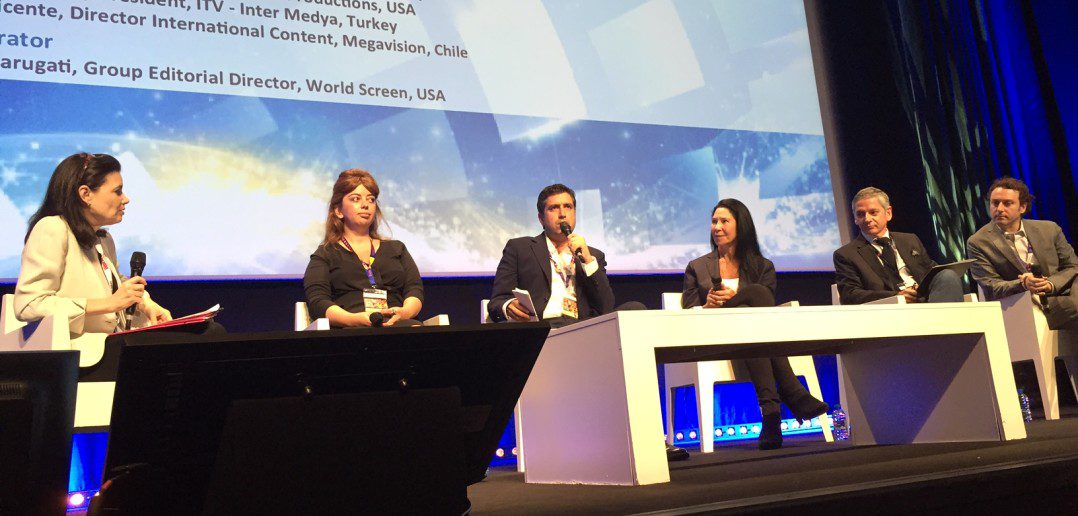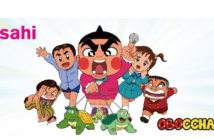This session revolved around the scope and universal themes in Turkish drama, including what makes it such easy export-bait, and why its stories are so compelling.
Moderated by group editorial director Anna Carugati of World Screen (far left), the panel included general manager Pelin Diştaş Yaşaroğlu of Kanal D, CEO Kerem Çatay of Ay Yapim, producer Kim Moses of Sander/Moses Productions, CEO/president Can Okan of ITV Inter Medya, and international content director Juan Vicente of Megavision.
Caligari kicked off by asking, point-blank, what it is about Turkish dramas that resonate with US audiences.
“Our relationship has been building and has had a lot of success over three years,” said Moses. “When we saw [Turkish drama] Son, which we turned into Runner, we knew it would attract a big star.” In this case, it attracted two: Paula Patton and Adam Rodriguez.
“The themes at the centre were very accessible to the United States,” Moses went on: “Female empowerment, thriller sensibility, family drama, and a mystery that unfolds with a conspiracy underneath.”
Turkey is highly prolific in social media: 40 million people actively participate, a critical factor in the US market.
This is because Turkey in general is very young: “The average age is 28, or, I think, 29 this year,” said Yaşaroğlu. “If you’re at a restaurant, you can still follow what’s happening on TV. Each programme is in the top tweets on Twitter. And even if you’re eating dinner in Chile or New York, you can still follow… because Turkish shows are world Trending Topics. We are very powerful in social media.”
The production values help: as Carugati points out, “You put every cent on the screen.”
The average length of a Turkish episode is 130-140 minutes with a budget of $300.000, according to Yaşaroğlu. Compare that with Moses’ figures for the average comparable US drama episode: 43 minutes long, with a $7M budget each.
“When we told writers how long an American episode is, they almost fainted!” Moses joked.
And although Runner was adapted for American audiences, it retains a distinctly Turkish core. The basic plot in both Turkey and the US follows a woman with a great family life who is married to an architect, who leaves on a trip and whose plane crashes. She believes he’s dead, but discovers he wasn’t on the plane at all. The conflict stems from the discoveries she makes as she investigates what happened to him.
“One thing we found interesting about taking the format and bringing it to the US was, how do you take the overarching themes specific to your specific culture” and apply it to the new one? Moses said.
The Turkish version was a family drama and thriller. But in the US, “it’s a little bit more thriller,” Çatay quipped. It originally also took place in both Turkey and Iran; the US version happens in Chicago and Mexico City.
“For us, the underlying theme is that there are 300M guns in the US and it’s a huge issue,” said Moses. “92% of people in the US have a point of view about guns. So we took the most culturally-relevant theme in the US—guns and gun-running—and put that at the center.”
The female empowerment theme, and the importance of family, remain. “We took all those pieces, wove them together, and kept, on top of that, the family thriller with this woman at the center,” said Moses, who reinforced the importance of social media. “Because it worked so well on social media in Turkey, we knew it would work for the United States.”
“Turkish drama has a storytelling that works in the US, in Chile, in Qatar, in Greece,” said Çatay. “It’s common sense. We didn’t do meetings to think about our storytelling”, and the success of one drama, like Son, helps others find a global audience.
“We don’t aim to produce for other markets. The main focus is domestic,” Çatay went on. “If it’s successful in Turkey, luckily it’s successful in other regions as well. If it’s not successful in Turkey, nobody will care. The main focus is to tell a good story.”
The conversation then turned to Latin America, in particular ITV Inter Medya’s relationship with Megavision in Chile.
“The success story of content in Latin America started with Mega Chile,” Okan begins. “We have reached 21 territories in Latin America, and growth is still in progress.”
ITV has a dedicated LatAm team, which includes Okan’s wife. “I believe that Turkish and Latin American family values are quite similar. That’s probably the main reason our content became successful.”
Following the success of Turkish drama Thousand and One Nights in Chile, Mega picked up Fatmagül’ün Suçu Ne?, or What is Fatmagül’s fault?. In this tale, a woman—Fatmagül—gets gang-raped. And over time, she develops a romantic relationship with one man involved in the incident.
“Tell them about the kissing part,” Vicente of Mega prompted Okan.
“What works for us is the excellent production value these shows have. And also because they look like us; that was very important. People can embrace that and say ‘they are here, they are one of us’,” Okan began.
“The other thing is how they work the love story. We are made of love stories in Latin America; the kiss is very important, it’s always in the first or second episode.” But Fatmagül was different: “It was, like, in the 113th episode that they kiss for the first time. And it was such a huge success—it was in the front page of the newspaper, the kiss between Fatmagül and Kerim! So much sexual tension.”
“The story’s power comes from the fact” that it’s a real story, Yaşaroğlu added.
Fatmagül was chosen because it begins with a rape, a serious issue in Chile. “How does it that from a rape you can construct a love story with a guy who was a participant in the rape?” Okan asked. “Our audience is 70% females.” And for them, the themes resonated: “The role of the woman, how she overcomes the rape, finds a new place in society, values herself again, and finds love again. It’s a love story about recovery.”
“You hate Kerim”—the love interest—”in the first episode,” Vicente continued. “By episode 10, you love him. They turn him around because he participated in the rape, but you realise he has a good soul. He really wants to take care of Fatmagül and love her.”
The case was much the same for Thousand and One Nights: “The guy pays a woman to have sex with him, and by the fifth episode, you love the guy!” Vicente exclaimed.
All this has created a thirst for Turkish content that is singular. “Now we don’t even change the name of the series,” said Vicente. “The next series we’re picking up is [Turkish drama] Ezel. And we’re going to keep that name. There’s already a brand there. We believe in the content, and it’s because the stories are good. It’s as simple as that. A good story will work anywhere.”
Moses confirmed this. Making reference to Israel’s rise in production clout after Homeland, she said, “Turkey is the new Israel”.




